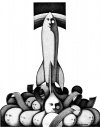Gravity's Rainbow Reviews
Summer 2005 - Bookforum Gerald Howard: "As most Pynchonians know, Corlies Smith — universally called Cork — was Pynchon's editor from the very start of the author's career. [...] On October 20 [1969] [Cork] wrote again to [Edward Mendelson, perhaps Pynchon's most astute and devoted academic critic,]: 'Sorry, nothing new on Pynchon's novel.' On March 5, 1970, Pynchon wrote to Cork to apologize that he was not going to make an April 1 deadline and asking that it be moved to July 1, 1970. He thanked him for his forbearance and ended by expressing his worry, with what degree of irony only he can say for sure, that the novel 'could be the biggest piece of shit since The Crying of Lot 49.'"
3/22/73 - The New York Review of Books - Michael Wood: "Gravity's Rainbow is literally indescribable, a tortured cadenza of lurid imaginings and total recall that goes on longer than you can quite believe. Its people, like the characters in V., are marginal people, layabouts, dropouts, gangsters, failed scientists, despairing spiritualists, spies, SS men, dancing girls, faded movie stars."
3/11/73 - New York Times Book Review - Richard Locke: "Pynchon's new book is thus an event — it breaks seven years of silence and allays the fear that he might never go beyond his early success. Gravity's Rainbow is longer, darker and more difficult than his first two books; in fact it is the longest, most difficult and most ambitious novel to appear here since Nabokov's "Ada" four years ago; its technical and verbal resources bring to mind Melville and Faulkner."
3/5/73 - Time Magazine Review - R. Z. Sheppard: "And now Gravity's Rainbow, which is V. squared and 49 cubed. It is a funny, disturbing, exhausting and massive novel, mind-fogging in its range and permutations, its display of knowledge and virtuosity — a metaphysical, phenomenological, technological Mad Comic."
